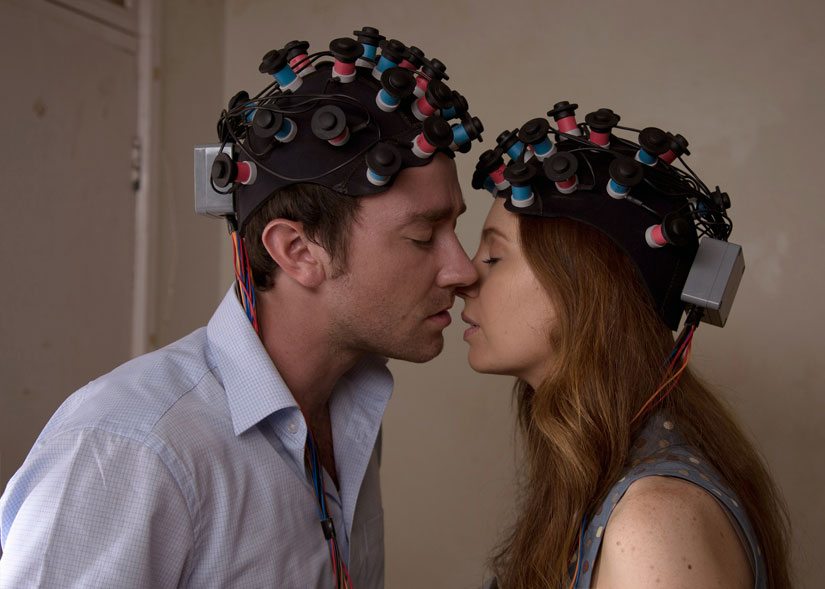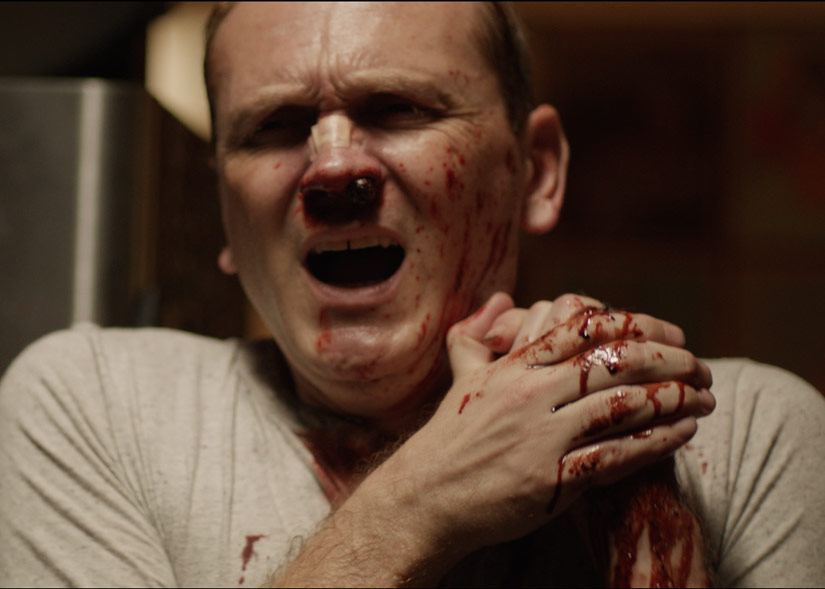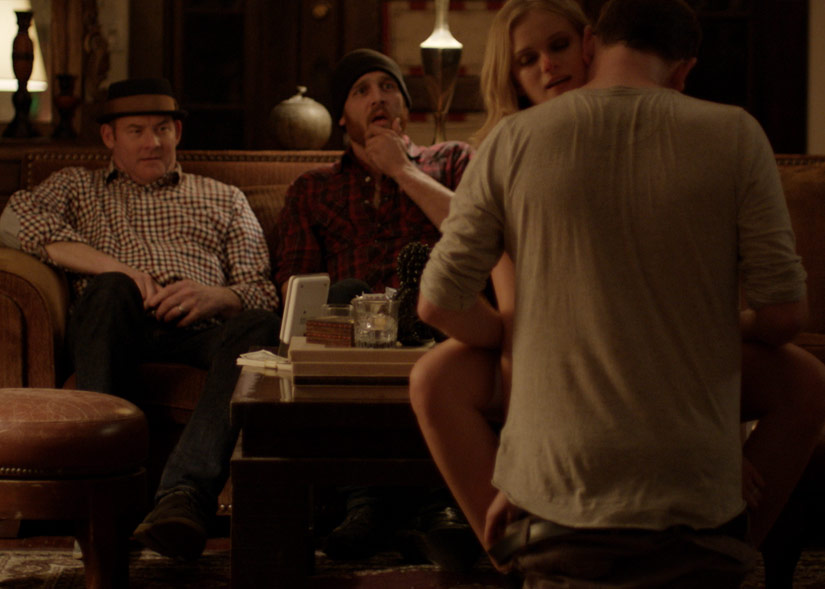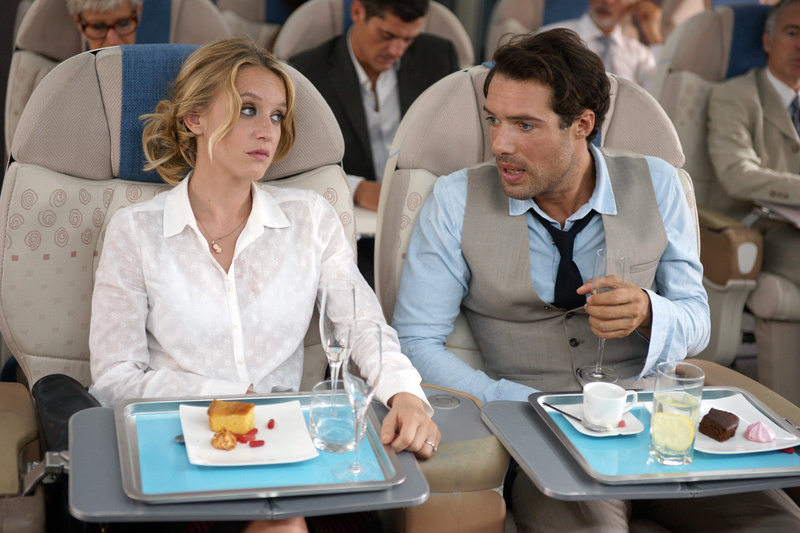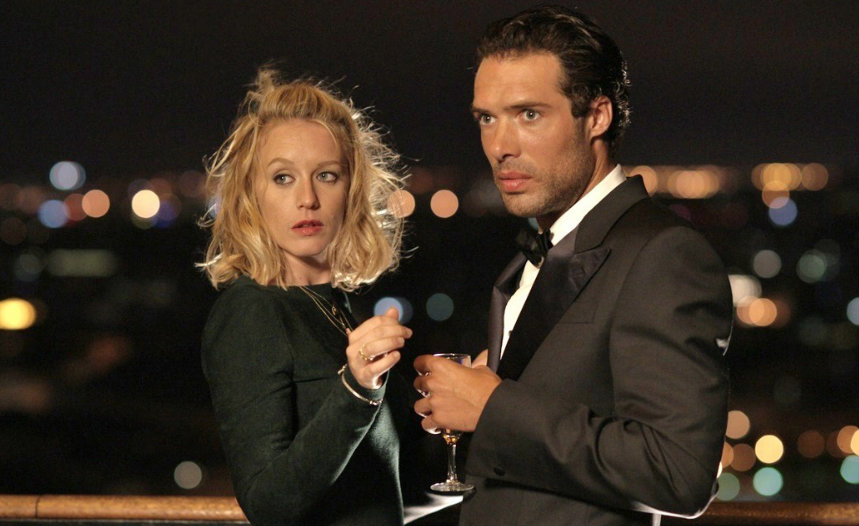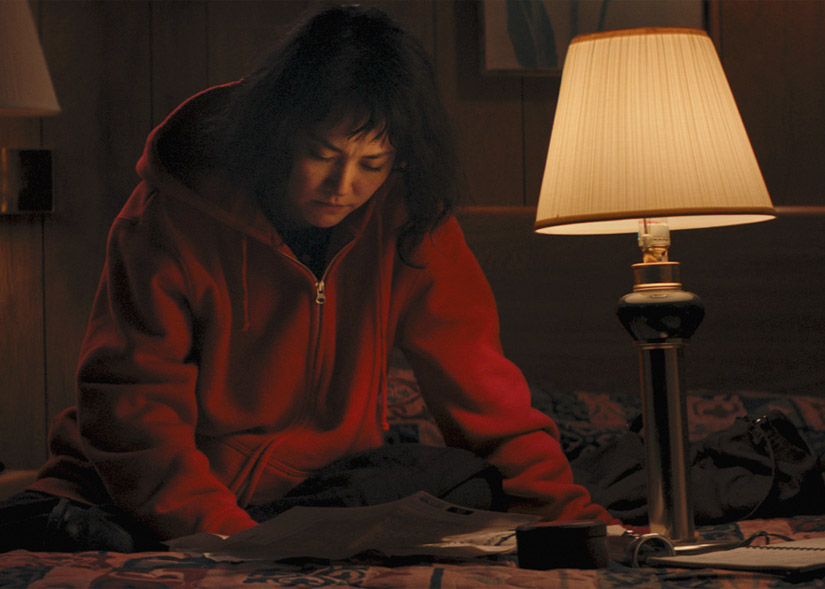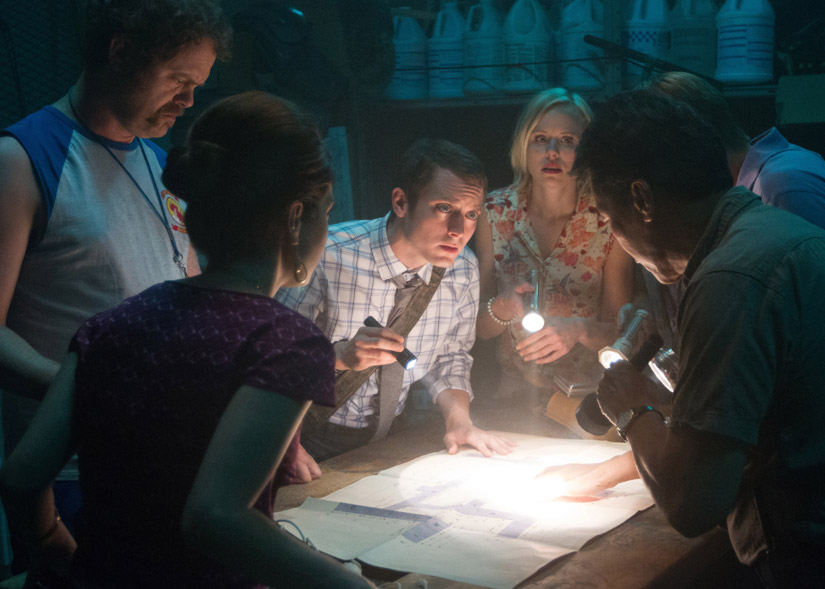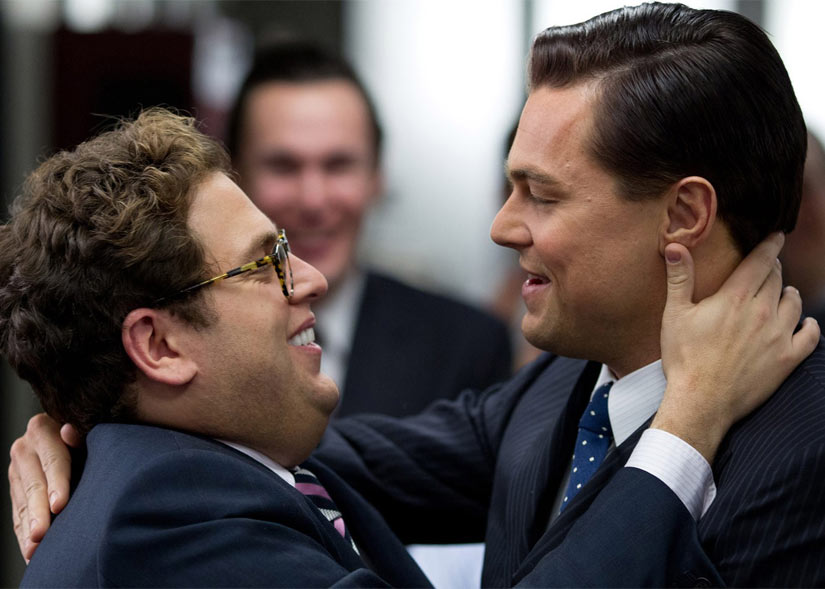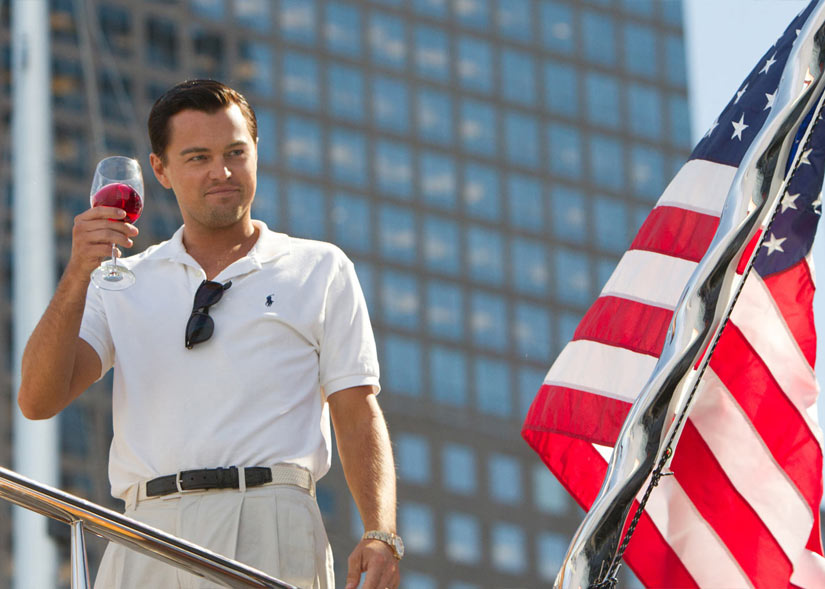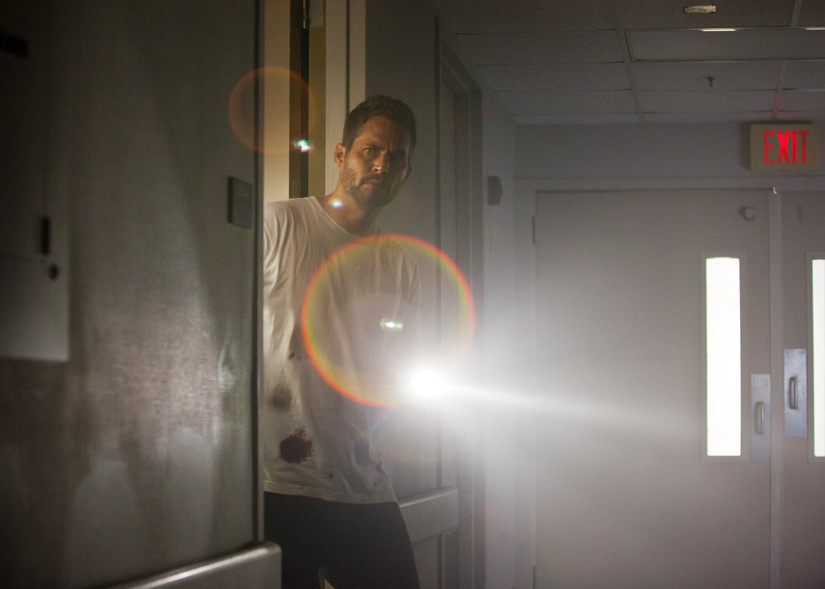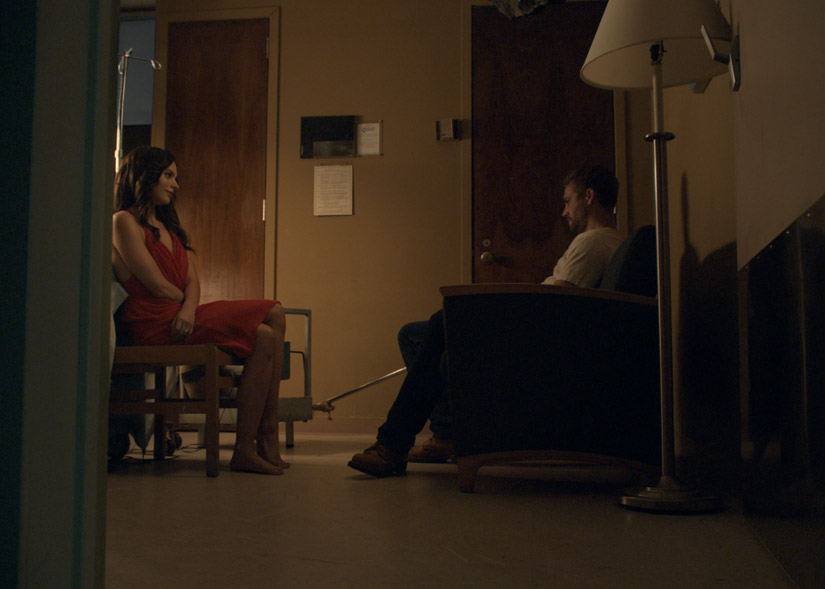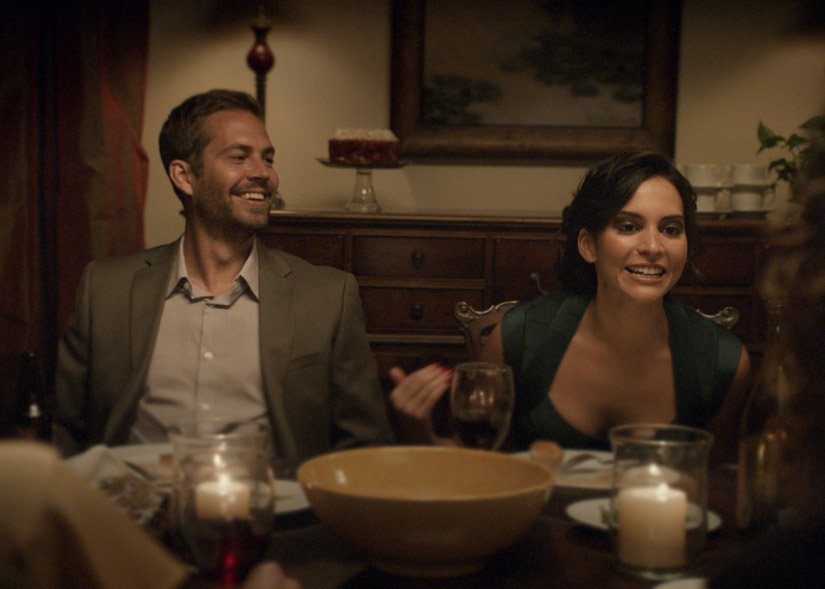[SXSW Review] The Infinite Man
[Ruby Hornet will be covering SXSW from March 7th to March 16th. Follow along as we bring you exclusive film reviews, photos, daily features, and interviews with filmmakers, actors, and musicians!]
[youtube id="uoFv9eezboI"]
The Infinite Man
Director: Hugh Sullivan
Rating: N/A
Release Date: March 7, 2014 (SXSW)
Time travel films are my kryptonite, and I don't mean that in a negative way whatsoever. If I find out a film has some type of sci-fi element that involves intricate loops and that not only add depth to the narrative, but also gets audiences more involved and invested in piecing all of the events and characters together. When used properly, the time travel device can greatly enhance the experience; misused, and it just feels like any other gimmicky device to entice potential audiences. The Infinite Man is not such a film.
To celebrate their anniversary, the eccentric scientist Dean (Josh McConville) takes Lana (Hannah Marshall) to special resort with a full itinerary planned. However, when it turns out that the location has closed, Dean does everything he can to salvage the weekend. His quest for the perfect weekend is further ruined when Lana's ex-boyfriend, Terry (Alex Dimitriades), shows up, and an altercation between the two men takes place. After letting Lana leave with Terry, Dean spends the next year dedicated to meet the perfection he was unable to display a year prior by creating a time traveling device. Through a series of events, Dean takes Lana into the past in hopes of salvaging the lost weekend... no matter how many attempts it takes.
At its base, The Infinite Man is a love story with a sci-fi ploy to help drive the main crux of the film. However, the story isn't just about Dean's love for Lana; rather, it's the journey of his ability to let go and understand that he can't always be in control of everything. As somebody who can sometimes be a meticulous planner and has to schedule almost every facet of his life days and weeks ahead (you should see my SXSW schedule), I empathized strongly with Dean. His ethos is driven not from his desire to control Lana, but to express just how much he loves her. Unfortunately, his attempts to express himself goes too far.
With one set, a barebones cast of characters, and an emotional story that must be carried not only emotionally, but comedically by its cast, The Infinite Man could have easily fallen apart were it not for McConville and Marshall's acting abilities, with Dimitriades' smaller role balancing the two leads with his comedic follies. McConville fits not only as the everyman protagonist that anybody would cheer for, but also for those of us who are so full of love, but struggle to express it properly and fittingly. Marshall's role as the object of Dean's desires could have been marginalized to bring further focus on Dean, but writer/director Hugh Sullivan wrote her part exceptionally well so that she not only was Dean's "reward," but also a capable support for him. (Unfortunately, I can't go deeper than that for fear of spoilers.)
Lighthearted and fun in its comedy, nuanced with depth in its narrative, The Infinite Man could have been one large mess of a film. However, Sullivan's ability to not only keep the sci-fi elements clear and easy to understand, but to keep the focus at Dean's personal core is what helps The Infinite Man balance everything deftly. You'll enjoy putting the puzzle pieces together; you'll cheer Dean on, even when you've noticed the negative signs of his acts; and you'll leave the film with a smile on your face.
[Review] Cheap Thrills
How far would you go to take care of your family, for a quick buck that could provide financial stability? Desperate times call for desperate measures, and Cheap Thrills is a film about desperation in two men. Framed as a "comedy thriller," E.L. Katz's film debut is a pulpy, late-night thriller that will attain a cult following. However, will that sense of appeal attract the average moviegoer? Read on and find out.
[iframe id="movies.yahoo.com/video/cheap-thrills-red-band-trailer-231043378.html?format=embed&player_autoplay=false"]
Cheap Thrills
Director: E.L. Katz
Rating: N/A
Release Date: February 21, 2014 (Movies on Demand), March 21, 2014 (Limited)
Craig (Pat Healy) is an aspiring writer facing financial troubles with his wife and young son. After finding an eviction notice and being laid off from his auto shop job, he decides to drown his sorrows at a local bar. There, he is reunited with an estranged old friend, Vince (Ethan Embry). As they catch up, they attract the attention of a married couple, Colin (David Koechner) and Violet (Sara Paxton). The couple offer low-risk dares to Craig and Vince for a few hundreds of dollars, but as the night goes on, the dares become riskier... and the money greater. Exactly how far would the two old friends go for the promise of a new life?
The four characters play specific archetypes that help move the film along. Craig is the desperate lead audiences hope to empathize with; Vince is the down on his luck, selfish ne'er do well; Colin is the abundantly rich instigator; Violet is the mysterious, silent fourth party. However, unlike other thrillers that lack any real empathy or humanity, each character displays some level of decency. For example, while Colin is the main proprietor pushing Craig and Vince to embarrass and demoralize themselves (and each other), he still has a set moral line that he won't cross. At the same time, as the bets become larger, Craig and Vince's levels of morality are slowly stripped away. The real question, then, is the money enough to lose yourself and your humanity?
Unfortunately, Cheap Thrills doesn't answer this question. While there are shallow hints at the cost of Craig and Vince's sacrifices, it's never fully analyzed. As a pulp thriller, this is somewhat acceptable; it would just have added an extra level of depth to a film that, for better or worse, is perfectly summarized by its own title - Cheap Thrills is nothing more than that. With such a promising premise, the film falls flat and doesn't live up to its potential.
One of the largest reasons for the film falling short is the film's tone. Even though it's branded as a "comedy thriller" and there are a few light-hearted moments, any sense of comedy is gone by the wayside. Rather, the film is built up with more and more exploitative scenes of desperation, culminating in a really dark ending. While this will attract horror fans, it didn't work for me. If the tone were more in line with a dark satire or had something "extra," I think I would have been more receptive to the film.
As I insinuated earlier, Cheap Thrills is nothing more than its title. There will be scenes that'll make you cringe, and horror/thriller/gore fans will love them. However, if you're looking for something with much more substance, you'll be better suited looking elsewhere.
[RH Review] Love is in the Air
The earliest part of the year always seem to be somewhat of a drag as far as cinema goes. Box offices are fueled by the lust of Valentine’s Day, and it seems that cheesy romance prevails over high quality filmmaking. However, if there is any time when the cheesiness of these types of films can be somewhat forgiven, it would be during these early months of the year when the holiday is celebrated.
Upon beginning Love Is In The Air (Amour et Turbulences), I had a lot of expectations of it being a just another corny romantic comedy. However, I had a slight hope that its French origin would give it a few interesting twists and turns here and there. Sadly, my original expectations were fulfilled. While it is definitely not the worst film in its genre, it lacks anything within the plot line in order to make it stand out from other films produced of this kind.
[youtube id="ViEiu0XrGNE"]
Love is in the Air
Director: Alexandre Castagnetti
Country: France
Release Date: January 31st, 2014
Julie (Ludivine Sagnier) is a young woman headed to the airport in order to get back to her fiancé in France. She is quite the perfectionist but has a drive to succeed with her artwork. Simultaneously, Antoine (Nicholas Bedos), an attractive womanizer of sorts, scrambles from the aftermath of a party to catch the next available flight to France. Coincidentally, he and Julie sit beside each other. The moment they lock eyes, a montage of flashbacks reveals that the two have had some sort of relationship in their past. They, while sharing their multitude of stories to passengers on their 6 hour flight, argue and reminisce on times when the chemistry was strong between them. As the sparks slowly rekindle, the pair finds themselves conflicted as to what will happen when their plane touches the ground.
As far as classic Hollywood film structure goes, this film fits right in. While it is pretty clear that those who made this movie were not signing up for anything life-changing, it seems like an effort to make this story more interesting was absolutely non-existent. The formula-ed film structure is utilized with little to no creative variation, and I must say that I could have told you the ending within the first scene. Like most romantic films, it was bland and full of situations that have been in far too many similar workings. Perhaps if they had veered a little bit off this extremely beaten path it would have caught my attention more.
I think romantic comedies set everyone's standards too high on how to live in a real relationship. As far as films in this category go, Love is in the Air was very well done. Little choices such as lighting or conditions on the airplane are well thought out for the tensions in each situation, but they don't make up for all of the convenient coincidences.
Although it only follows the classic, linear formulation for creating a screenplay, it is utilized in its best form to capture the lightheartedness that this film takes on. People love these kinds of movies because they are simple, fairly short, and make them feel really good about themselves after. It is easy to follow, and it would make for a good movie to watch on a rainy day. I can't see this being a movie to be remembered for a lifetime, but I guess it is a lot better than most creations out there.
Love Is In The Air is certainly not a film for everyone. Lacking a complex plot line or reason to think that the two main characters wouldn't end up together in any way is super ridiculous. It completely fulfilled all of the requirements in order to have it be extra corny. Nonetheless, if it weren't for its subtitles (because most Americans are usually too lazy to read them), I could see this film blowing up (unfortunately) like anything Nicholas Sparks smacks his name onto. Love Is In The Air is a cute, simple, romantic film that I personally did not enjoy just because of the cliché it perpetuates, but most normal, 20-something females probably will.
[Sundance Review] Kumiko, the Treasure Hunter
[Ruby Hornet will be at Sundance Film Festival 2014 providing coverage of the festival's 30th year. Keep it tuned to Ruby Hornet this week as we share reviews, interviews, photos, and more at one of the country's largest film festivals.]
Kumiko, the Treasure Hunter
Directors: David Zellner
Rating: N/A
Release Date: January 20, 2014 (Sundance)
Films affect us in the most mysterious ways. For some, we find inspiration and influence in the art form. For others, we're absorbed into the universe and fall in love with the romantic notions of a cinematic life. There's no denying the effect art has on our everyday lives, but we can't succumb into the fictional universes infiltrating our minds. Exactly how far can we allow films to affect us?
Kumiko (Rinko Kinkuchi) is a loner with no real direction in life. While the rest of her co-workers genuinely love their positions as office workers, she doesn't find the same joy out of the monotony of her day-to-day life. Even her Mother constantly rains doubt onto her, badgering Kumiko about her lack of drive and interest in marrying and starting a family. There are only two beams of light in Kumiko's life: her bunny, Bunzo, and a delusional plan to unearth the buried treasure in The Coen Brothers' Fargo. Exactly how far Kumiko lets her delusions take over could represent the turning point she desperately needs in her life, no matter the ramifications.
Kumiko, the Treasure Hunter is set up as a road film, with the first half of the film taking place in Japan and the second taking place in Minnesota. The main source of conflict in the film harkens to the ideals of the Japanese social structure and how Kumiko simply doesn't fit into it. The rigors of finding a good job, a good husband, and beginning a family at a young age carry over Kumiko's head like an unrelenting raincloud. She finds her escape through the Coen Brothers classic, both figuratively and literally, ultimately falling down the rabbit's hole on a journey that, for better or worse, is heartbreaking in how delusional her psyche really is. Kinkuchi, best known for her role as Mako Mori in last year's Pacific Rim, deftly carries the weight of the film on her shoulders, her physical and emotional vulnerability complementing her character's.
Another high point of Kumiko, the Treasure Hunter is not found in the film's plot or acting, but in its soundtrack. Indie/electronic band The Octopus Project scored the film with its airy, atmospheric music matching Kumiko's quiet journey from Japan to Minnesota. The film received a Jury Award for their Musical Score, and it's not hard to see why.
Kumiko, the Treasure Hunter is a sad character study. Every break in which you expect to find Kumiko snap out from her fantasy world is shattered whenever she makes a self-assured decision to continue on her journey. Yet, in spite of acknowledging that the journey won't end well, you can't help but cheer her on and hope that somehow, someway, there really is a treasure underneath that X.
[Sundance Review] To Kill a Man (Matar a un hombre)
[Ruby Hornet will be at Sundance Film Festival 2014 providing coverage of the festival's 30th year. Keep it tuned to Ruby Hornet this week as we share reviews, interviews, photos, and more at one of the country's largest film festivals.]
To Kill a Man (Matar a un hombre)
Director: Alejandro Fernandez Almendras
Rating: N/A
Release Date: January 17, 2014
How far would you go to protect your family? With our backs to the wall and facing a large threat, I'd imagine the answer would be, "Whatever it takes." However, not everybody can truly be prepared for the ramifications of their actions, even if it's in the name of safety and protection. In Alejandro Fernandez Almendras' To Kill a Man, an unassuming, middle-class husband and father of two is prodded and pushed to the brink until he takes matters into his own hands. However, the consequences of his actions are too much for him to bear for long.
Jorge (Daniel Candia) is a passive man who falls victim to bullying from some neighborhood scumbags led by one man, Kalule. When Jorge's son, Jorgito, decides to defend his father, things escalate when Kalule shoots him, then shoots himself to stage an act of defense. However, Kalule is sent to prison for a small period of time; upon his return, tensions escalate as he stalks and threatens the entire family until Jorge simply takes matters into his own hands.
To Kill a Man is a character study analyzing the effects a murder can have on a man. One of the most prevailing themes found in the film is the idea of masculinity and gender. Early in the film, Jorge's masculinity is ridiculed and taunted by the neighborhood scoundrels. His passive manner isn't exactly the most masculine, especially in Latino cultures. Even at his breaking point, Jorge isn't a hyper-masculine being; rather, he's still unconfident and unsure of his actions, even after the line is crossed.
As with most character studies, To Kill a Man is a quiet, slow-moving film. Because of this, there's a tendency for the film to plod and move too slowly at times. There may not be enough driving action to keep certain audiences engaged. However, those that do hang on will enjoy Jorge's journey and Almendras' exploration into the mind of a man desperate to do right by his family.
[Sundance Review] Cooties
[Ruby Hornet will be at Sundance Film Festival 2014 providing coverage of the festival's 30th year. Keep it tuned to Ruby Hornet this week as we share reviews, interviews, photos, and more at one of the country's largest film festivals.]
Cooties
Directors: Jonathan Milott and Cary Murnion
Rating: N/A
Release Date: January 18, 2014
Everybody growing up remembers cooties. At one point in time, we've all received a cootie shot after the patented "circle, circle, dot dot" prescribed to us by our caring friends. In a way, the cootie shot was a rite of passage to protect us from the other sex until, well, we began thinking about sex. However, imagine if "cooties" were real, and the virus ended up being something much much worse than getting boy/girl germs on you?
Jonathan Milott and Cary Murnion's Cooties addresses this very idea, albeit in a dark, and twisted manner. The "cooties" in Cooties are nothing more than an exaggerated result of diseases meat getting eaten by a young girl who falls ill. As her sickness manifests in something much more sinister, spreading across an entire school full of summer school children, it's up to the teachers, led by Clint (Elijah Wood), an aspiring writer who subs in for a sick teacher at his childhood elementary school, his childhood friend, Lucy (Alison Pill), her boyfriend, Wade (Rainn Wilson), and the other fellow teachers, played by Jack McBrayer (30 Rock), Rainn Wilson (The Office), Leigh Whannell (Saw III), and Nasim Pedrad (SNL), to attempt the school with two young survivor before they become another cafeteria meal.
Cooties is like a zombie film, with the zombies played solely by children. The added wrinkle is kind of fun, with a handful of current/former teachers at my screening referring to the film as "cathartic." There's something fun about seeing adults attack little kids, albeit with the added caveat of them becoming monsters. However, beyond that dark twist (and what it says about our enjoyment in seeing kids being beaned with high speed baseballs and sliced with katanas), Cooties otherwise feels very run of the mill.
While the film starts on a high note and ends on an exciting level, the entire second act of the film just drags on and halts all the progression and energy up to that point. Some of the jokes don't really stick during the second act, either. Despite a cast full of sitcom stars and comedic actors, Cooties was sorely lacking in the humor department. A minor role played by LOST's helped keep the film on a good, humorous tone, but ultimately, the laughs simply weren't there.
Cooties presented a twist to the typical zombie film, but only by a minimal margin. There's a sense of social commentary behind the outbreak, but again, it's nothing out of the ordinary that we've come to expect from the genre. It's fun, light, and could find a cult following from fans of the actor and genre, but everybody outside of those circles might want another cootie shot.
[RH Review] The Wolf of Wall Street
The Wolf of Wall Street is the fifth collaboration between director Martin Scorsese and actor Leonardo DiCaprio. With every subsequent film made together, the two have grown increasingly comfortable with one another with DiCaprio becoming Scorsese's contemporary muse akin to his previous collaborations with Robert De Niro. However, it's with The Wolf of Wall Street that the two have achieved a heightened level of comfort and accomplishment that has been building up since the duo's first film, The Gangs of New York.
To call The Wolf of Wall Street the two's best film is an easy statement to make. To call it Scorsese's best film, however, is a sentiment that carries almost five decades' and more than 20 films' worth of accolades, awards, and accomplishments. Yet, here I am right now telling you with a bold face: The Wolf of Wall Street is Martin Scorsese's best film to date.
[youtube id="iszwuX1AK6A"]
The Wolf of Wall Street
Director: Martin Scorsese
Rating: R
Release Date: December 25, 2013
The Wolf of Wall Street is an adaptation of Jordan Belfort's memoir of the same name. During the late '80s and early '90s, Belfort and his partner Donnie Azoff (Jonah Hill) ran a brokerage firm, Stratton Oakmont, that took Wall Street by storm. Over years, the firm grew exponentially, bringing in riches for everybody in the company. Of course, their practices were less than legal, but when money talks, you listen, right? It all comes to a head when a federal agent begins to investigate the company following an expose on Belfort in Forbes.
This is the bare-bones summary of the film's narrative. However, like any great film (let alone a Scorsese-directed one), there's so much more to it, and to delve deeper would honestly spoil the experience for all of you reading this. Instead of digging deeper into the narrative, let me expound on why this is both Scorsese's best film and DiCaprio's best role to date. It's twisted, manic, eye-opening, and everything you may ever want in cinema.
One of the most primary and prominent themes carried through Scorsese's filmography is his analysis of machismo and masculinity, and The Wolf of Wall Street may be the most eye-opening of his films in this regard. While the film carries a dark comedy tone through its entirety, it's through this warped lens of humor. Belfort's story is one full of extravagance, and Scorsese exploits and perhaps even exaggerates this all to a grandiose scale. Everything from hills of cocaine snorted from a hooker's butt crack to awkward S&M scenes to midget tossing is in The Wolf of Wall Street. Take the most ridiculous scene from every late-'90s/early-'00s rap video, mix them together, and you have a framework for The Wolf of Wall Street's abundance.
Yet, it all fits together and makes sense. The Wolf of Wall Street is so much more than a memoir adaptation; it's more than just an analysis of masculinity in the face of young money. Much like Harmony Korine's Spring Breakers, which itself was a film embodiment of the "spring break experience," Scorsese's latest opus is the embodiment of nihilistic hedonism, not just in narrative terms, but in the way Scorsese's cast has never previously explored, which alone serves as the film's highest point.
DiCaprio and Hill serve as the film's nucleus, and the chemistry between the two is amazing. Drop any preconceptions you may have about Hill as an actor - Hill's time to truly shine has finally arrived, and it's through Scorsese's masterful direction that Hill can finally shed his past as a one-note funny man. Sure, he was nominated for a Best Supporting Actor Oscar for Moneyball, but most crowds will still remember him from Superbad. Given some time, The Wolf of Wall Street will prove to be the benchmark for his career thus far. Hill's Donnie Azoff is still essentially the same character he's played for years (i.e. Jewish comedic foil), but he takes the character to new heights through a mixture of his comedy past and Scorsese's ability to simultaneously reign him in and let him go.
The same thing can be said about DiCaprio's performance, albeit at a larger scale. Simply put, you haven't seen a Leonardo DiCaprio role like this. Keeping in line with the film's theme of nihilistic hedonism, DiCaprio lets loose in a way I have never seen from him; it's like he completely sheds who he once was and becomes Belfort. This comes off as a film cliche about actors losing themselves in their roles, but DiCaprio's transformation is so brilliant and near-perfect. DiCaprio's Belfort is manic, self-serving, nihilistic, sexist, but at the same time, he's caring, protective, and giving. It's this balance of portraying a lovable drug addict, a caring sexual deviant, a money-obsessed Robin Hood, a by-the-books walking contradiction that sets this performance above all of the rest.
The Wolf of Wall Street is full of risks (and rewards), and it's the comfortability between Scorsese and DiCaprio that allows the film to even indulge in such risks (further pushing along the theme of hedonism). There's one particular sequence towards the end of the second act where you can just tell Scorsese, DiCaprio, and Hill were just feeding off of one another's energy. I don't want to spoil it, but you'll know it when you see it, and you'll leave the scene never looking at old Popeye cartoons the same way again.
The majority of the supporting cast is full of archetypes that, for better or worse, fulfill these roles as they were needed, but don't stick out beyond that initial need. For instance, Kyle Chandler (Friday Night Lights) is the hard-nosed federal agent, Jon Bernthal (The Walking Dead) is the badass enforcer, Brian Sacca is the mousy junior partner, etc. In a very minor, yet important role, Matthew McConaughey sets the stage for the film early on, acting as Belfort's mentor.
As you may remember, The Wolf of Wall Street faced some editing problems a few months ago, pushing its original November date to Christmas. It clocks in at almost three hours (2 hours, 59 minutes to be exact), but you don't feel its longevity throughout the film. Instead, you're carried through an abundantly entertaining film that keeps the energy high from start to finish. With that said, some fat could have been trimmed, especially when the film slightly hurtles to a conclusion in the last 30 minutes or so.
The Wolf of Wall Street carries everything you love from Martin Scorsese (modern crime, analysis of masculinity, overabundance of profanity, the "American Dream,"etc.), but with a focus on exploring the comedy genre. It's over the top, but not cheesy; grandiose, but refined. The Wolf of Wall Street is overindulgent in its riches, its drugs, its sex, and it's everything you never knew you wanted in a film. If, heaven forbid, this is the final film between DiCaprio and Scorsese, know that they're going out on top.
[RH Review] Hours
I don't know how to start this review. Do I keep it strictly focused on the film, or do I slant it towards Paul Walker and how Hours holds up in carrying his legacy alive following his untimely passing? It's hard to be critical of an actor's performance in light of their passing, especially when a film is released only weeks following their death. However, I can honestly say with dignity that Walker's performance in Hours is one of his best. However, is it enough to carry the entire film?
[youtube id="2wT4KPsy2gc" mode="normal" align="center"]
Hours
Director: Eric Heisserer
Rating: PG-13
Release Date: December 13, 2013
On the eve of Hurricane Katrina, Nolan (Walker) and his wife, Abigail (Genesis Rodriguez), are admitted to a hospital in New Orleans due to Abigail going through a premature labor. As the storm becomes stronger, Abigail's resolve weakens, dying in childbirth. As Nolan struggles with the loss of his wife, Katrina becomes stronger, forcing everybody in the hospital to evacuate. However, Nolan's premature daughter must stay connected to a neonatal incubator to stay alive. With the power diminishing and no help in sight, Nolan must protect his daughter at all costs with every passing minute turning into another grueling hour.
Walker may be best known as an action star because of his role as Brian O'Conner in the Fast & Furious films, but Hours was his attempt at displaying his dramatic range. Designed as an isolated character film, Hours trusts the entirety of the film on Walker's performance. The trust Heisserer had in Walker is paramount, and the actor made the most of it. He still plays the same everyman character he's known for, yet it fits entirely into what the film needed.
When one thinks of a character-driven, isolated film (re: Buried, 127 Hours), it's expected to be an introspective psychological character study. Hours, however, is built as, essentially, a one-character thriller. The conflict, Man vs. World, is framed through the crux of the film is put entirely on the timed mechanic of baby Abigail's survival. With the lack of power, Nolan is forced to use a backup generator to keep his daughter's breathing normal. However, it only holds a charge in three-minute increments, disallowing him from resting, but also actively searching for help. As the film goes on, the amount of time given per charge begins to diminish, and with it, Nolan's energy.
Over the course of the film, Nolan is faced with external threats that, honestly, take away from the film. I understand why looters were used as these threats - Hours is, after all, set during and in the wake of Hurricane Katrina, and looters played as much of a role as the storm itself. However, while their presence was meant to pose as another conflict to Nolan, it took away from the real threat. I wouldn't have removed them completely; rather, I would have used them differently. Again, I can understand their involvement in the film as the aforementioned secondary external threat and how the encounter coincides with Nolan's mental descent/heightened defense over his daughter.
Early on, Hours began establishing itself as a father coping with the passing of his wife while developing an emotional connection to his newborn daughter, the struggle over having to reconcile the conflicting emotions following a death and birth, and the external conflict of Hurricane Katrina. Hours could have went many ways, whether it was an intensive psychological drama, an action/thriller, or many other routes. Instead, it shared bits and pieces from all of the avenues it could have followed. That decision takes away from the film's direction.
Ultimately, however, Hours is weighted on Walker's performance. His Nolan was similar to Bryan O'Conner, albeit reigned in, but Walker's dramatic chops were developing. As it stands now, Walker's performance in Hours was his best ever captured on the big screen. The trust Heisserer put in Walker's abilities was wholly justified, and it's unfortunate to know that we'll never see just how far he would have been able to take his acting abilities.

